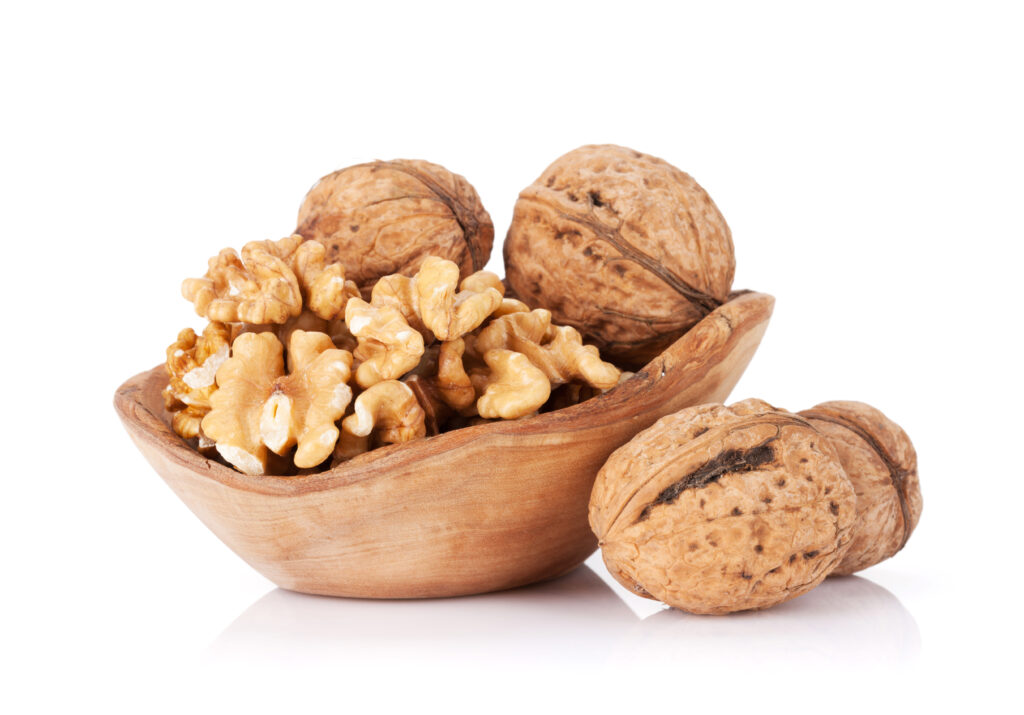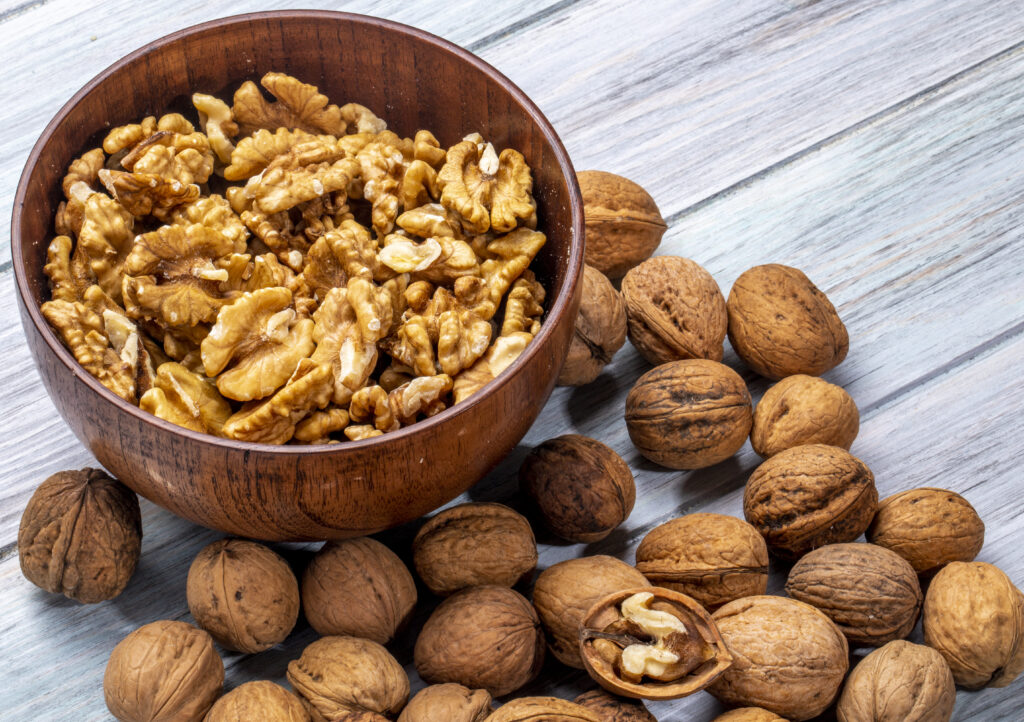Introduction:
Nature has provided us with a wide variety of healthful foods, each with a special set of advantages. Among them, walnuts are a nutritional powerhouse that is full of vital components that support general health. Often called “brain food,” these crunchy treats have many health advantages in addition to satisfying your palate. In this blog, we shall explore the many Benefits of Walnuts of including walnuts in your diet.

Rich in Omega-3 Fatty Acids:
Walnuts are unique in that they contain a lot of omega-3 fatty acids, especially alpha-linolenic acid (ALA). Because they lower cholesterol, improve blood vessel function, and reduce inflammation, these essential fats are vital for preserving heart health. Including walnuts in your diet might be a practical method to enhance your omega-3 consumption, as they offer a plant-based supply of these important fatty acids.
Heart Health:
The beneficial effects of frequent walnut eating on cardiovascular health have been the subject of numerous studies. Walnuts include antioxidants, polyphenols, and omega-3 fatty acids, which help decrease blood pressure and lower the risk of heart disease. Furthermore, the amino acid arginine aids in the synthesis of nitric oxide, which relaxes blood vessels and enhances blood flow.

Brain Boost:
Nutrient-dense walnuts, sometimes known as “brain food,” promote cognitive function. It is thought that the antioxidants, vitamin E, and omega-3 fatty acids in walnuts help with focus and memory. Including walnuts in your diet may help preserve brain function and lower your chance of developing age-related cognitive decline.
Antioxidant Powerhouse:
Antioxidants found in walnuts include melatonin, polyphenols, and vitamin E. These antioxidants shield cells from harm brought on by free radicals, aiding in the body’s fight against oxidative stress. The anti-inflammatory characteristics of walnuts can lead to a lower risk of chronic diseases, including certain types of cancer.

Weight Management:
Studies have indicated that including walnuts in a balanced diet may help with weight management, despite the widespread belief that nuts might cause weight gain. Walnuts’ healthful fats, protein, and fiber all work together to encourage feelings of fullness, which lowers overall calorie intake. Furthermore, walnuts’ high nutritional density delivers critical nutrients without adding needless empty calories.
Improved Gut Health:
Walnuts’ high fiber content encourages regular bowel movements and guards against constipation, which is beneficial to digestive health. Furthermore, walnuts have prebiotics, which are foods for good gut flora. Since gut microbiota has been related to many aspects of health, including immune system performance and mental health, maintaining a healthy microbiome is essential for overall wellbeing.
Diabetes Management:
Walnuts are high in energy content, yet they might be good for diabetics. Walnuts’ fiber and good fats help to better regulate blood sugar. A balanced diet that includes a reasonable amount of walnuts may help control blood glucose levels and lower the risk of type 2 diabetes.
Bone Health:
Essential elements including calcium, magnesium, and phosphorus are found in walnuts and are crucial for strong, healthy bones. Consuming walnuts and other foods high in calcium increases bone density and lowers the risk of developing diseases like osteoporosis.
Versatility in Culinary Applications:
Walnuts have many health advantages, but they are also very adaptable in the cooking. Walnuts give a delicious crunch and nutty flavor to a number of foods, whether they are added to salads, oats, yogurt, or baked goods. Their versatility enhances both taste and nutritional value, making it simple to incorporate them into your regular meals.

Types of Walnuts
- English Walnuts (Juglans regia):
- Description: Worldwide, English walnuts are the most commonly consumed variety. They contain two smooth, lobed kernels inside of a thin, light-colored shell that is easily cracked open.
- Flavor: The mildly sweet flavor of the kernels makes them a flexible addition to savory and sweet recipes.
- Nutritional Profile:English walnuts are a well-liked option for supporting heart and brain health because of their abundance in omega-3 fatty acids, antioxidants, and vital minerals.
- Black Walnuts (Juglans nigra):
- Description: Native to North America, black walnuts are prized for their thick, tough shell. There is a noticeable, deeply grooved look to the inner kernel.
- Flavor: Compared to English walnuts, black walnuts have a stronger, bolder flavor that is more earthy. Their distinctiveness makes them an acquired taste for others.
- Nutritional Profile: Although black walnuts and English walnuts have identical nutritional profiles, black walnuts have a stronger flavor because of their higher concentration of certain polyphenols.
- Persian (or Carpathian) Walnuts:
- Description: A widespread variant of English walnut growing in the Carpathian region is the Persian walnut. In comparison to regular English walnuts, its shell is thinner.
- Flavor: The flavor is comparable to English walnuts, with a somewhat different profile affected by the peculiar growth conditions of the Carpathian region.
- Nutritional Profile:Persian walnuts are an excellent source of important minerals, healthy fats, and antioxidants, and they offer many of the same nutritional advantages as English walnuts.
- California Walnuts (Juglans hindsii and Juglans californica):
- Description: A type of English walnut known as “California walnut” is produced in the state of California, one of the world’s leading producers of walnuts.
- Flavor:They are frequently recognized for their quality and flavor, and the flavor is consistent with typical English walnuts.
- Nutritional Profile:Because they provide a good balance of antioxidants, minerals, and omega-3 fatty acids, California walnuts are highly valued for their nutritional content.
- Heartnut (Juglans ailantifolia var. cordiformis):
- Description: The heart-shaped kernels that set them apart from other members of the Japanese walnut family are what make them unique. Their shell is thin and smooth.
- Flavor:Like English walnuts, heartnuts have a mild, sweet flavor, and their distinct shape and flavor make them popular.
- Nutritional Profile: Healthy fats and vital elements may be found in walnuts, which enhances general health.
- Butternut (Juglans cinerea):
- Description:Native to North America, butternuts are also referred to as white walnuts. Their thick, ridged shell gives them an extended form.
- Flavor: Because of their sweet, mild flavor, butternuts can be used in a variety of culinary applications.
- Nutritional Profile: Butternuts, like other walnuts, provide several health advantages, including antioxidants and omega-3 fatty acids.
Conclusion:
In summary, walnuts’ health advantages go much beyond just their delectable flavor and crisp texture. Walnuts have many health benefits, ranging from diabetes control to weight loss, cognitive function to heart health, and they are a great complement to any diet. By adding this nutrient-dense powerhouse to your meals, you improve the flavor while simultaneously giving your body a wide range of vital nutrients that support general health. In order to reap the many health benefits of walnuts, think about reaching for a handful of them the next time you’re craving a snack.


Good morning! thebharatentertainment.com
Did you know that it is possible to send business offer according to law? We propose a secure and legal way of sending commercial offers through feedback forms.
It is improbable for Feedback Forms messages to be marked as junk, since they are taken into great consideration.
We offer you the chance to try out our service for free.
We are here to send up to 50,000 messages for you.
The cost of sending one million messages is $59.
This message was automatically generated.
Please use the contact details below to get in touch with us.
Contact us.
Telegram – https://t.me/FeedbackFormEU
Skype live:feedbackform2019
WhatsApp +375259112693
WhatsApp https://wa.me/+375259112693
We only use chat for communication.